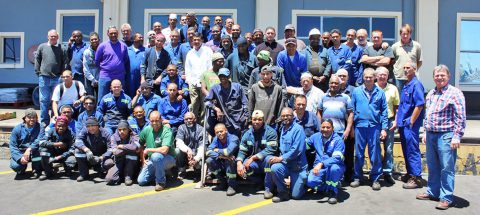Food Basket
Fishing For The Future
Founded around 1980 by entrepreneur Nico Bacon, Viking Fishing is a pioneering company in the fishing and aquaculture industries. Started with just one deep-sea trawler, the company now owns a fleet of fishing vessels, three Hazard Analysis and Critical Control Point (HACCP) compliant seafood processing facilities, and a number of fish farms in southern Africa.
Viking has never aimed to be the biggest entity in its field, says group operations director Tim Reddell, because they believe an increase in size could damage South Africa’s fishing industry as a whole.
“There was never a vision to become ‘big’. Economies of scale are necessary to protect a fishing company from the environmental and climatic changes that nature throws at one,” says Reddell. “Growing was a protection measure to ensure that jobs created remained sustainable.”
Sustainability governs Viking Fishing’s approach to its day-to-day operations. But the company’s first priority – beyond haul – is how its employees and cottage industry fishermen will be affected.
“Any quota reduction requires belt tightening. At a point, this invariably leads to job shedding,” says Reddell. “Our [Agriculture, Forestry and Fisheries] minister often draws an analogy with mining. The reality is people work for mining companies. The same is true for fishing. One is unable to accommodate all aspirant rights holders with sustainable quotas.

“In the case of fishing communities, there is absolutely no reason why they are not able to work alongside, and receive skills from, companies to make them viable,” says Reddell.
“In many cases this may actually mean the creation of jobs allied to fishing and not necessarily in fishing.”
Viking Fishing also sees one of its goals as feeding back into smaller fishing communities. The company views itself as one of South Africa’s smaller fishing fleets, and its management hasn’t forgotten its humble roots.
“We have always been mindful of where we’ve come from. So whether it’s a fisherman whose vessel is in need of a tow, or an operator who needs to sell stock urgently for cash flow, we’ve always assisted,” says Reddell.
“Additionally, we’ve got more joint ventures running than anyone else. So from Port Nolloth to Port Elizabeth we work with communities and individuals.”
Above all else, Viking Fishing – like many other small-to-medium fishing companies – knows that profitability goes hand in hand with the sustainable use of natural resources. Overfishing both breaks down the environmental balance and kills off potential future earnings.
This is one of the reasons Viking Fishing has embraced aquaculture, even though it’s been hard on its earnings at times. The ocean is a finite resource and those who rely on it for a living need to understand and respect its natural balance.
“One must always be conservative with natural resources,” says Reddell. “You cannot drive profits. You need to reinvest and you need to keep funds for a rainy day.”
The necessity of aquaculture
“The reality is that even with properly managed quota systems throughout the world, there is, and will continue to be, a shortage of seafood products,” says Viking Fishing’s group operations director Tim Reddell.
“Many nations have successfully embraced aquaculture to grow their offering. The reality in South Africa is that we don’t have a sympathetic coastline for aquaculture. Also, the cost of feed rules out a lot of low-value species for farming. I guess the journey I started was to give back, but also the challenge was exciting.”
Viking Fishing is committed to aquaculture and even though the costs may be high, the company has its eye on the future.
“Whatever you thought your costs [around aquaculture] would be, double them,” says Reddell. “Aquaculture is not for the faint-hearted.”
Fast fact
According to the Southern African Sustainable Seafood Initiative (SASSI), South Africans consume 312-million kilograms of seafood every year.






 Sign-up and receive the Business Media MAGS newsletter OR SA Mining newsletter straight to your inbox.
Sign-up and receive the Business Media MAGS newsletter OR SA Mining newsletter straight to your inbox.